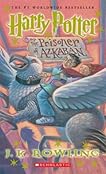 Taren at The Chick Manifesto posted a question about spoilers last week that made me pause a bit before writing this post. I find it difficult to write about books without giving away too much, but I really do think that, for Harry Potter at least, the no-spoiler rule expired a while ago. So if you haven't read Harry Potter yet, (1) get on that (2) before reading the rest of this post.
Taren at The Chick Manifesto posted a question about spoilers last week that made me pause a bit before writing this post. I find it difficult to write about books without giving away too much, but I really do think that, for Harry Potter at least, the no-spoiler rule expired a while ago. So if you haven't read Harry Potter yet, (1) get on that (2) before reading the rest of this post.So Harry Potter and the Prisoner of Azkaban is definitely my favorite of the early Harry Potter books. (In my head, I split the series in half -- books 1-4 are rerise-of-Voldemort and books 5-7 are how-do-we-redestroy-Voldemort.)It's also the last of the streamlined books in the series -- I started re-reading The Goblet of Fire last night, and holy macaroni, I can barely hold it -- but despite this, Prisoner of Azkaban packs a lot of story, backstory, and character development into what is, comparatively, a short read.
The story begins, as always, at the end of Harry's miserable summer with the Dursleys, but Harry's stay with them ends this time on his own terms, as he packs up and storms out after a galling (and funny) incident with Aunt Marge. Harry catches the Knight Bus quite by accident, but not before he learns about the escaped criminal Sirius Black and sees the big black dog that seems to follow him throughout the rest of the story.
Once Harry returns to Hogwarts for his third year, we begin to learn more about Harry's father, James, and his time at school, as well as about the circumstances surrounding Harry's parents' deaths, which are more complicated than we (and Harry) originally thought. We meet Remus Lupin, the new Defense Against the Dark Arts teacher and one of my favorite characters in the series, who has a number of secrets that affect Harry greatly. Lupin is such a tragic figure -- I would argue more so even than Sirius Black -- but he bears his burdens with dignity, recognizes his errors, and tries to rectify them.
(Obviously I think Snape is the most tragic figure in this series, for reasons that are not revealed in Prisoner of Azkaban but that we see inklings of in his interactions with Sirius during the climax. Poor Snape. Knowing his history and what is to come, I feel a lot more sympathy for him in rereading the series.)
We also meet the Dementors, the Azkaban guards who have come, ostensibly, to protect Hogwarts from the threat of Sirius Black but whose true motives are suspect. (I mean, even Dumbledore hates them, and I tend to trust Dumbledore's judgement.) The Dementors are seriously frightening, and the fact that whenever Harry is around them, he hears his mother about to be killed by Voldemort, well, that doesn't make them any more cuddly.
But the Dementors lead Harry to work with Lupin more closely and to learn the Patronus spell -- which of course plays a significant role in the rest of the series but also leads to one of its most powerful scenes as well, when Harry sends his fully formed Patronus -- a stag -- against the Dementors in order to save himself, Hermione, and Sirius from the Dementor's Kiss. (I'll be honest here: the moment that the Patronus stag returns to Harry and he realizes its significance always makes me cry. No less so on this reread.)
When I first read Prisoner of Azkaban, I remember that the climax in the Shrieking Shack, when Harry discovers the truth about Sirius Black, took me by surprise, but in the reread, I see how perfectly Rowling sets it up (even from the beginning of The Sorcerer's Stone, when Hagrid mentions seeing Sirius Black at the ruins of the Potter house). I especially like how a number of plot points from the two previous books return here: the origin of the Whomping Willow and the longevity of Scabbers, among others.
I also love Buckbeak, of course, and how Hagrid's efforts to save him intersect with Hermione's Time-Turner and Sirius's eventual escape. Every plot point, in fact, seems to dovetail at the end, which, for me, makes this the most satisfying book of the Harry Potter series.
Ultimately, so much is introduced in Prisoner of Azkaban that it could feel more like exposition than plot. But the story -- of the hunt for Sirius Black, of Harry's struggle with the Dementors and what he experiences when he's around them, of the continually developing friendship between Harry, Ron, and Hermione (which is tested and reaffirmed yet again) -- is both gripping and affecting.
It is, in essence, the perfect lead-up to Harry Potter and the Goblet of Fire, which begins the descent into the darker half of the Harry Potter series. Oh, yes, now the death count truly begins, and I have to keep tissues nearby for cry-worthy moments, of which there are many.
No comments:
Post a Comment